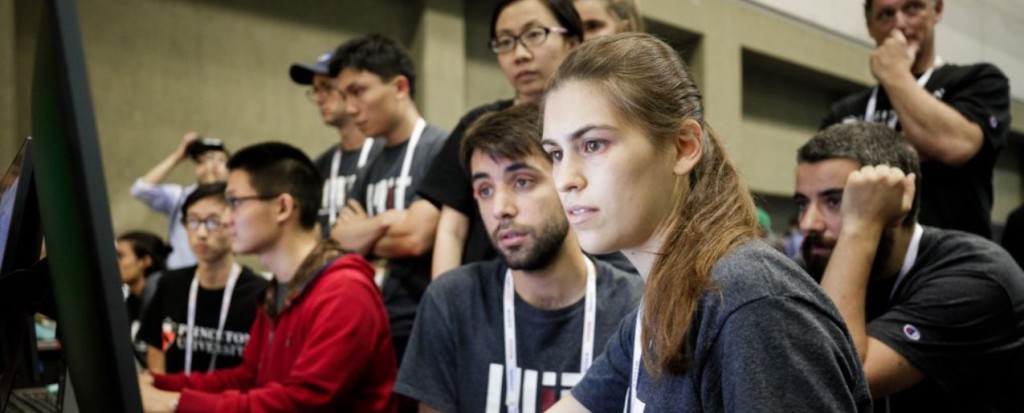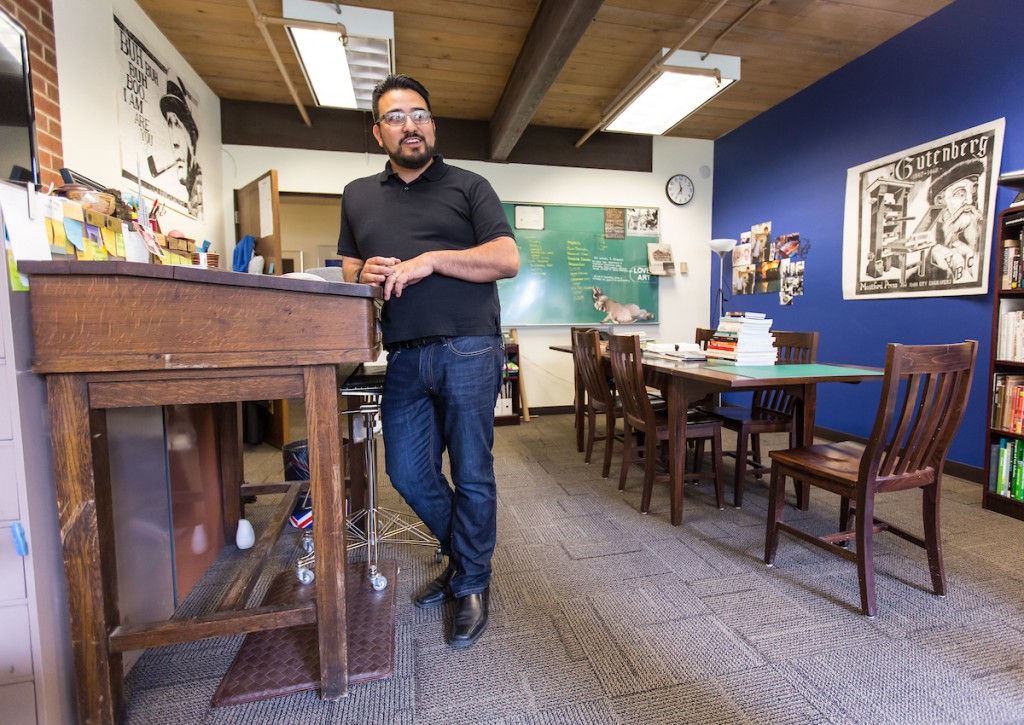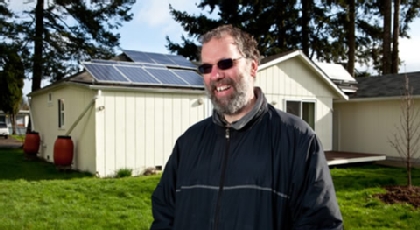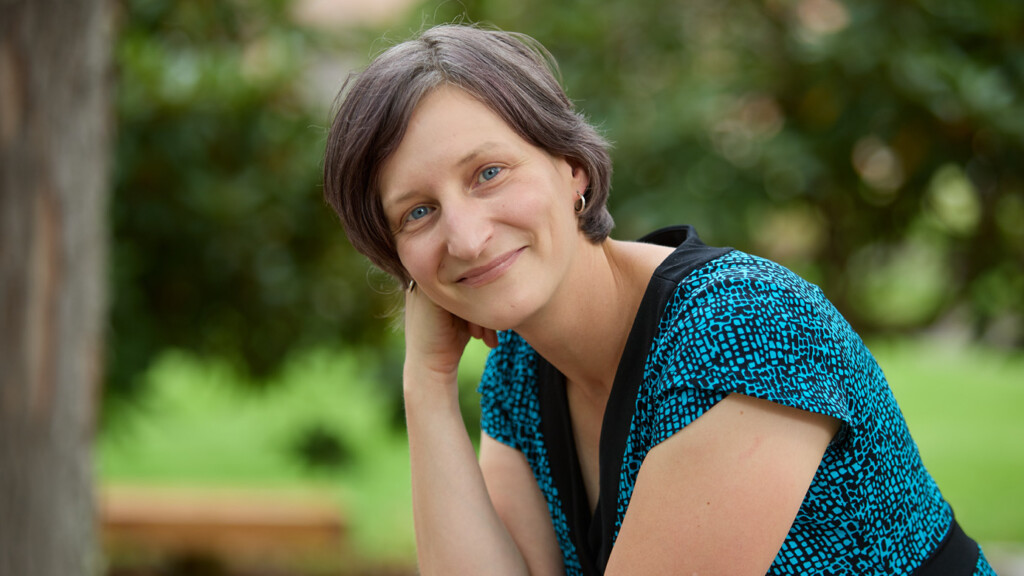Page 182 • (1,834 results in 0.049 seconds)
-

A diverse and dynamic artist and educator, Mare Blocker has been teaching at PLU since 2014. Her classes include Art of the Book and Typography among others. Read more about Mare in this extended interview. What is your educational background? I have a BFA in…
paintings. He had a few booths at the Seattle Center in the 60’s and 70’s, right after the World’s Fair, and I spent a lot of time there with him and my grandmother. I like to say I grew up in the Fun Forest. We dressed up and did “quick draw” portraits. So corny. My grandparents silkscreened sayings on small pieces of wood and called them plaques or desk signs. They sold them for .35 or 3 for a dollar, by the thousands. If you’ve seen a piece of wood with a moose on it and a piece of jute as a tail
-

On Monday, February 19, 2018 (President’s Day), students at Pacific Lutheran University are invited for a special tour of Amazon’s Seattle headquarters (HQ). The event is being sponsored by Amazon and PLU’s office of Career Connections and Alumni and Constituent Relations . Interested PLU students…
for Windows, the Mac, smart phones, and other devices (does anyone remember programming printers?). I will tell you that it takes a long time for a company to build-up the tools and infrastructure to get engineers excited about a new technology. Not so with Amazon Alexa. The software development tools are readily available now for experimenting with Alexa and making a connection in your favorite programming language. (The top four used now are Java, JavaScript, C#, and Python.) Take a look at this
-

By Michael Halvorson. Halvorson is director of Innovation Studies at Pacific Lutheran University. Design has become an integral component of the innovation process. Leading businesses such as Amazon, Apple, Nike, Disney, Dyson, and Airbnb are all recognized for their award-winning designs that strive to…
design. She has appreciated the technical skills with Adobe Illustrator that she picked up in this class, as well as the team-and project-focused curriculum. Not only do Art & Design students work on numerous design projects in this class, but they also discuss (and defend) their concepts as they create them with peers and faculty members. Professor Avila took some time to describe the innovation and design principles that students learn in his Graphic Design course. “In design, we take content that
-

Elizabeth Larios ’21 decided she was going to be a neurosurgeon in the fourth grade. That’s when her class took a field trip to a science museum and Larios saw an exhibit about the human brain. Returning home that day, she told her mom: “I’m…
been three studies done on this subject, and none were in Namibia.” She plans to observe nurses and doctors to understand current hygiene standards before working with staff to create a collaborative infection control course to implement new standards.But her time in Namibia won’t just be spent conducting research. She will also teach marimba to fourth- and fifth-grade girls at a local private school. More than an aspiring doctor, Larios is also an accomplished musician and has been playing
-
Next of kin: the ethics of eating, capturing, and experimenting on great apes One of the pressing problems of our times is the future of the great apes. All of the great apes – chimpanzees, bonobos, gorillas and orangutans – are endangered. Their habitat is…
problems of our time.” While there are very concrete ethical concerns to be explored here, which philosophy is well equipped to do, there are also larger metaphysical questions about humans’ place in nature and the human-nonhuman relationship. While our work draws on research in biology, anthropology, psychology and ethology, we bring the systematic and sustained examination that philosophy provides by scrutinizing methods, assumptions and implications. By exploring lifelong questions of meaning
-

Organist off the Grid By Kari Plog ’11 Students and faculty often see Paul Tegels pedaling up and down the hills of Pacific Lutheran University’s campus, rain or shine. Tegels rides his bicycle every day, his common form of transportation, to and from his home…
through this process before, he said this was the first time Parkland Light & Water had ever done this. Solar panels on the roof of Paul Tegels’ house. “They were very responsive and very open,” Burkhartzmeyer said. Tegels was eager to invest in the project, and was surprised at the difficulty of carrying out his idea.“I had no idea I needed special permission,” Tegels said. “It was a learning process for me and for Parkland Light & Water.” According to an article in Ruralite, a publication
-

By Sandy Deneau Dunham PLU Marketing & Communications TACOMA, WASH. (Jan. 26, 2015)—After World War II, government authorities removed thousands of American Indian children from their families and placed them in non-Indian foster or adoptive families. By the late 1960s, an estimated 25 to 35…
: Sagas of Pacific Lutheran University from 1890 to 1965 (1965) and Now or Never: Reflections of the Fullness of Time (1957) and contributed numerous articles to historical and religious journals. One of Dr. Schnackenberg’s most frequently expressed wishes was that Pacific Lutheran University might establish a lectureship that would, on a regular basis, bring to the campus distinguished members of the world academic community to discuss significant topics of historical interest. Accordingly, the
-

TACOMA, WASH. (Dec. 15, 2016) Pacific Lutheran University alumna Jessica Anderson ’07 is passionate about education, geosciences and technology, and has combined all three to become an award-winning educator. In 2016, Anderson was named the Montana Teacher of the Year and received a Presidential Award…
learning model you use. How did you start down this particular path as an educator? I started with my physics students, creating lessons online on a learning management site and having them complete assignments within a window of time. This was great, because I knew students could take more ownership of their learning and self-manage their progress. I wanted to be able to give them more personalized feedback. I didn’t want to limit their learning with a deadline or with grades, I wanted them to be able
-

On a chilly February morning, cars packed the parking lot of the Pacific Lutheran University Olson Fieldhouse. There was no basketball game or volleyball match enticing the visitors, but rather a historic event that brought visitors in that day. It was the first of many…
gain valuable, hands-on experience. PLU nursing professor Lorena Guerrero noted the importance of the event in providing that platform for students. “Students have been wanting to become more involved in the pandemic,” she said while also volunteering her time at the clinic. “A lot of their clinicals have been affected, in one way or another, by the logistics and the surge in patients that a lot of hospitals have had. Things like this where a student can spend seven hours giving shots and learning
-

In the summer of 2016, Rev. Jen Rude and her spouse Deb packed their things and drove two thousand miles West on Interstate 90 to a new home and a new call. Six-and-half years later, Rude is no longer PLU’s “new pastor from Chicago.” Now…
time? When I first showed up I was focused on getting to know the community, designing Campus Ministry programs, etc. Now I’m thinking a lot more about how I’m part of the ecosystem of student life and the university. I’m thinking about how I can embed myself and Campus Ministry in places where people are already gathered. This can be as simple as sharing a reflection at a faculty meeting. Or joining the Center for DJS (Diversity, Justice and Sustainability) in work they are doing around student
Do you have any feedback for us? If so, feel free to use our Feedback Form.


